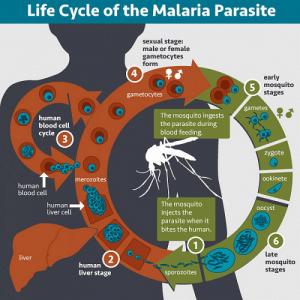Health
Zika virus persists in the central nervous system and lymph nodes of Rhesus monkeys

Transmission electron microscope image of negative-stained, Fortaleza-strain Zika virus (red), isolated from a microcephaly case in Brazil.
- Read more
- 341 reads
Antidepressant may enhance drug delivery to the brain

Normally, P-glycoprotein prevents most medicines from entering the brain by pumping them back into the blood stream (left). The addition of amitriptyline temporarily turns off P-glycoprotein pumps, allowing drug molecules to cross the blood-brain barrier (right).
- Read more
- 327 reads
NIH statement on World Malaria Day — April 25, 2017

National Institute of Allergy and Infectious Diseases, National Institutes of Health
- Read more
- 349 reads
Ghana, Kenya and Malawi to take part in WHO malaria vaccine pilot programme
The World Health Organization Regional Office for Africa (WHO/AFRO) announced on April 24th that Ghana, Kenya, and Malawi will take part in a WHO-coordinated pilot implementation programme that will make the world’s first malaria vaccine available in selected areas, beginning in 2018.
- Read more
- 341 reads
Prevent malaria - save lives: WHO push for prevention on World Malaria Day, 25th April
At an event on the eve of World Malaria Day in Nairobi, WHO called for accelerated scale-up of efforts to prevent malaria and save lives, on April 24th.
- Read more
- 333 reads
High level calls for vaccinations for all : Immunization partners and countries celebrate African Vaccination Week

- Read more
- 310 reads
New hepatitis data highlight need for urgent global response
New WHO data reveal that an estimated 325 million people worldwide are living with chronic hepatitis B virus (HBV) or hepatitis C virus (HCV) infection. The WHO Global hepatitis report, 2017 indicates that the large majority of these people lack access to life-saving testing and treatment. As a result, millions of people are at risk of a slow progression to chronic liver disease, cancer, and death.
- Read more
- 315 reads
Drastic reduction in Neglected Tropical Diseases during the past 5 years: stakeholders to Take Stock of Progress in the African Region
With a drastic reduction in neglected tropical diseases (NTDs) during the past five years, the World Health Organization (WHO), donors, non-governmental organizations and government representatives of endemic countries are meeting in Geneva, Switzerland to build on the gains that have been made and reaffirm their commitment to the fight against Neglected Tropical Diseases (NTDs).
- Read more
- 285 reads
Fewer exams and better eye health? Aye-aye, finds type 1 diabetes study

A patient reads and eye chart.
- Read more
- 342 reads
Human Rights
Fostering a More Humane World: The 28th Eurasian Economic Summi

Conscience, Hope, and Action: Keys to Global Peace and Sustainability

Ringing FOWPAL’s Peace Bell for the World:Nobel Peace Prize Laureates’ Visions and Actions

Protecting the World’s Cultural Diversity for a Sustainable Future

Puppet Show I International Friendship Day 2020


